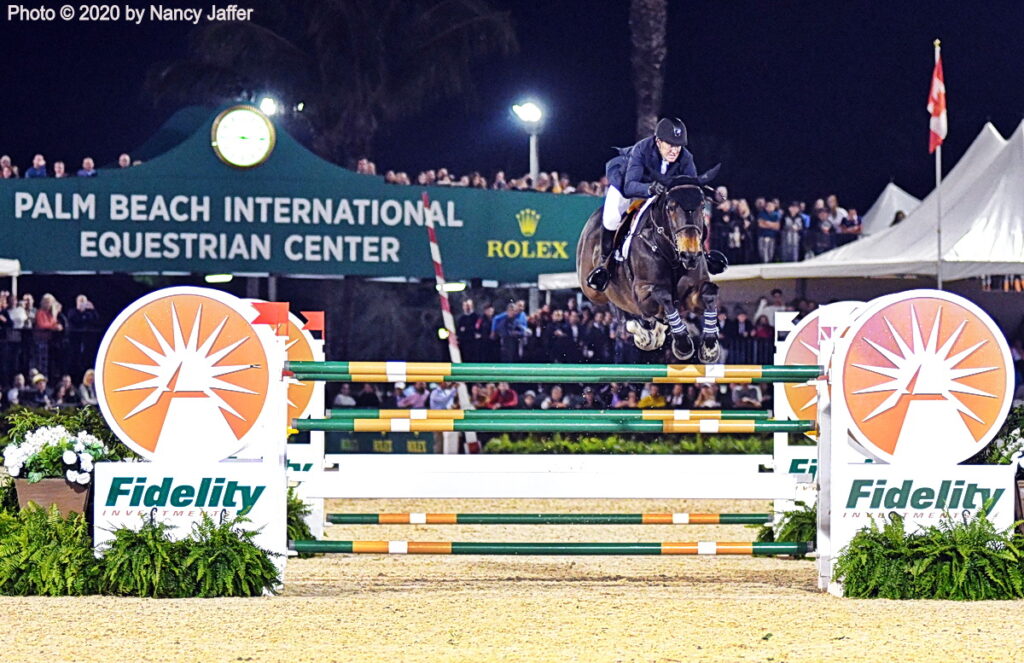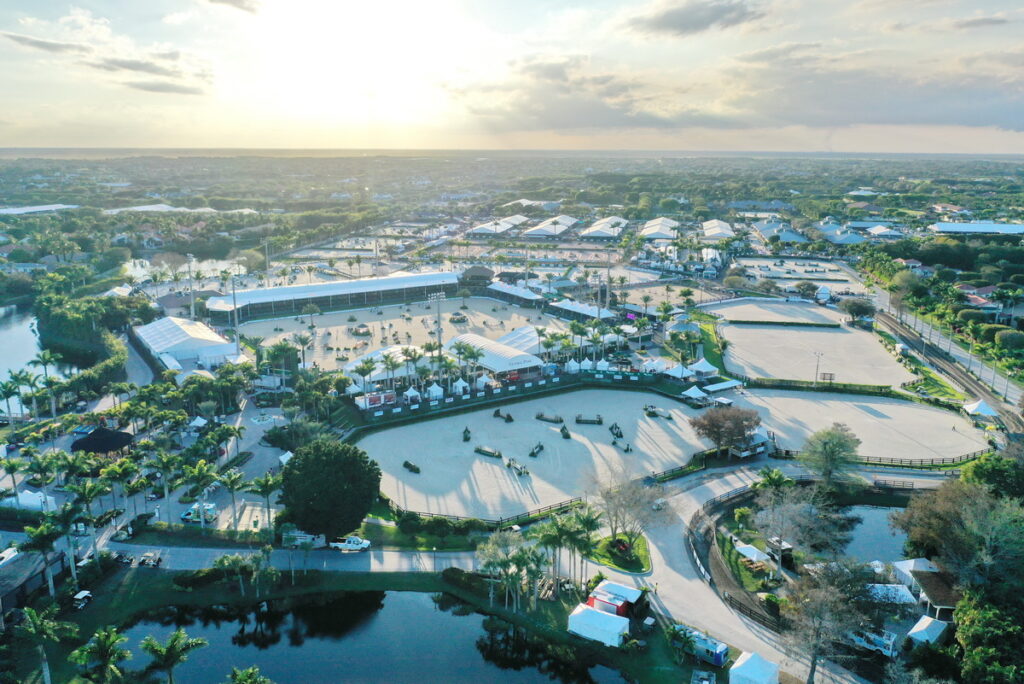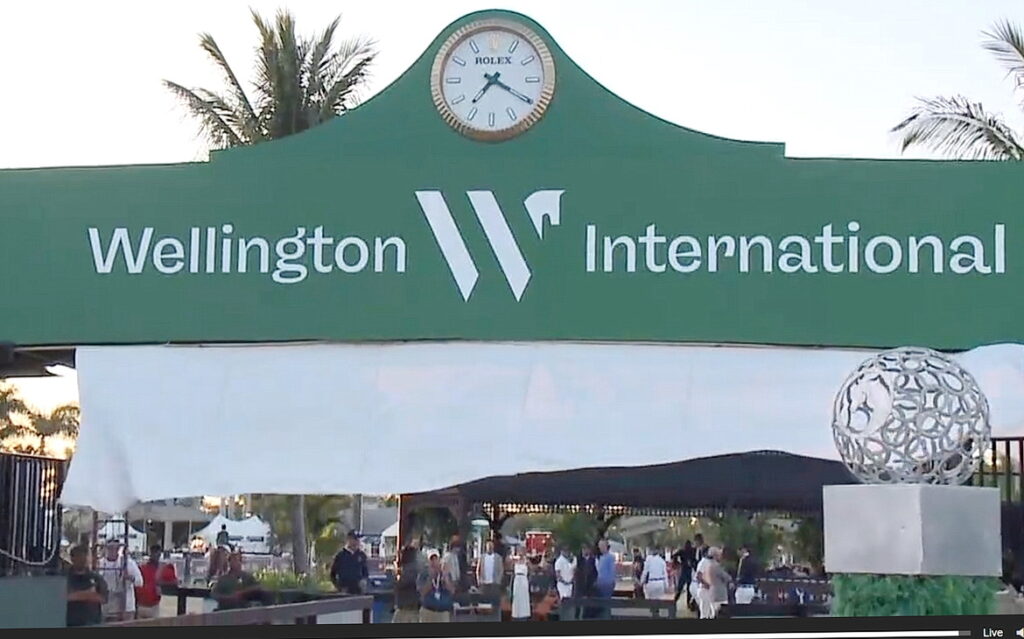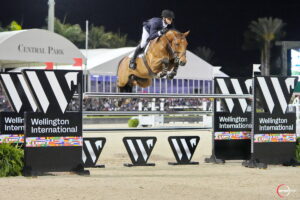Rebranding is a strategy used to update messaging after a business reorientation, to make the brand more relevant to new markets and new audiences, or to showcase the brand under a new parent company.
That should give you the context to understand why as of this evening, the Palm Beach International Equestrian Center that we have known since 2006 is now Wellington International, in Wellington, Fla., the municipality that bills itself as “the winter equestrian capital of the world.”
To recap, PBIEC was bought last year by the Global Equestrian Group, whose CEO is Andreas Helgstrand, an Olympic dressage medalist, while Olympic show jumping medalist Ludger Beerbaum is a co-owner.

McLain Ward against the backdrop of the old signage at the International arena. (Photo © by Nancy Jaffer)
Palm Beach is one of the world’s most prestigious destinations, so the change in name raised some questions for me, especially since very often, when I look up Wellington on the Internet, I get results listing Wellington, New Zealand. So here’s the answer from the folks who made the decision:
“While the history and status of Palm Beach is recognized, appreciated, and contributed greatly to the previous venue name, Wellington International looks to move forward and continue to bring the Wellington name greater prominence in Florida, the U.S., and around the world. Wellington is now a destination for thousands of equestrians every year and is a reputable name in its own right.”
The rebranding is visible as of tonight in the letters on the bridge above the International arena. In effect, it serves notice that the facility, which has hosted the Winter Equestrian Festival since 1989, will be undergoing major changes.
Michael Stone, president of Wellington International, said, “We are committed to ‘Setting New Standards’ for our venue, as well as for equestrian sport, guest experiences, entertainment, and innovation.
“While equestrian sport is and will continue to be the main focus at Wellington International, future plans include the versatility to host an assortment of events to broaden horizons outside of the main horse show weeks.”
Andreas had promised great changes to the venue, originally known as the Palm Beach Polo Equestrian Club. The winter shows started at Palm Beach Polo in a far more modest setting under the guidance of the late Gene Mische, who grew the WEF concept exponentially.
He had first seen the Palm Beach Polo property when it was nothing but a lot of palmetto, growing in a field about 40 minutes from Palm Beach. He recalled William Ylvisaker, the developer who started the facility, had painted a picture of a fabulous venue that would offer not only polo, but also magnificent horse shows.
Gene’s first reaction was to wonder whether the entrepreneur “was smoking something,” as the two stood talking among the scraggly plants. But the dream did become amazing reality in a setting that had people flocking to buy homes, show their horses and play polo (even Britain’s Prince Charles showed up there for a match.)
The facility was bought in 2006 by a group led by Mark Bellissimo, which made major changes and did a lot to move it forward. I was talking with Mark shortly after the purchase and mentioned the contributions of Gene in starting the enterprise. Mark noted that while an innovator must be given a lot of credit for starting something, it often requires someone else to take it to the next level. And that is where Andreas and company have come in.
They made some improvements already, with many more on the way. Recently, McLain Ward and I talked about what is happening.
“The changes made so far are things that are hard to see, like the changes of footing in a number of rings and some underground drainage and things that have been let go or not done properly in the past,” McLain told me.
“I hear of great things to come, which will be great for the sport. There’s no shortage of competitors and business and opportunity here. If there’s anywhere in the world that can support a huge investment, it’s Wellington.”

An aerial view of the showgrounds.
McLain, who has talked a bit with Andreas, said of the new owners, “I think they know what they’re doing. They have a good feeling of what the highest standard is. Like everything, it takes a bit of time. I think we’ll see major changes by next year and I think in the next few years it will be completely transitioned.”
As he pointed out about Wellington International, “It needs to be a world class facility. It’s been let go, it’s been run down for the better part of six to eight years. It’s a tired old house. I’d like to see them develop some of the land in the back, less for real estate, more for the sport, because we’re on a postage stamp here. I know there’s a lot of talk about developing the parking and stabling to more permanent facilities.”
I wondered what pioneers of the sport would think of its current incarnation.
“You can’t imagine not only where Wellington has gone, but the horse business and the sport,” said McLain.
“They set the groundwork and the stage for us to go in that direction. This is a big sport and big industry. The business factor has changed, not just in the running of events. It’s the horse business in general; the level of the business and the numbers, not only in volume, but also in dollar amounts. In 20-30 years it’s exploded. It’s a healthy industry and it’s nice to be part of a healthy industry.”
Want to know more about Andreas? Click here to read a story I did about him and his stable for Horse Sport earlier this month.



